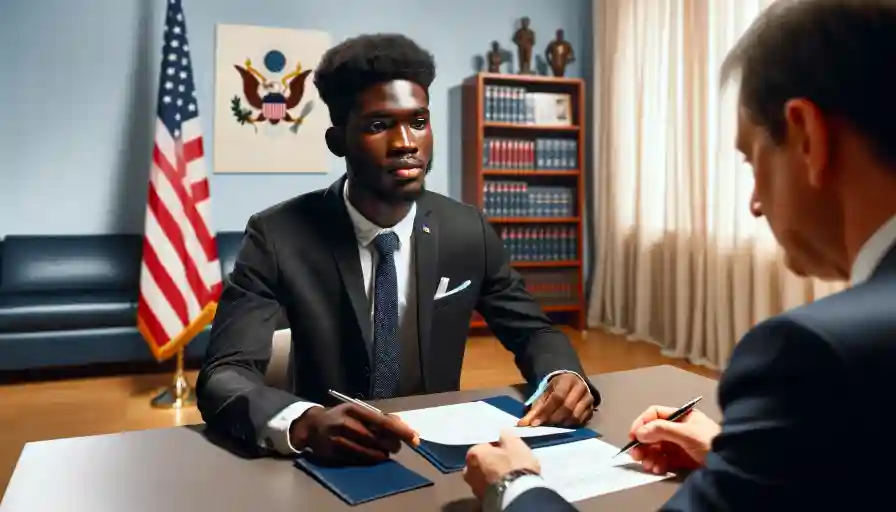A lot of students panic during US student F1 visa interviews. This explains why the US student visa rejection rate is 35% as of 2023. You don’t have to panic. All you need is proper preparation and clear goals of why you prefer the US as your study destination. In this post, we will discuss the common US student visa interview questions and answers for F1 visa. You’ll find many posts about personal experiences and prepared answers. The Department of Homeland Security advises students not to memorize answers taught by some coaches. This can lead to visa denials. We’ll explain what visa officers look for and how to create answers that reflect your situation. We’ll also look at examples to guide you and increase your chances of success.
This post covers the questions asked by Visa Officers and how to answer them well. After reading this, you’ll know everything necessary for obtaining your F1 student visa. An F1 student visa interview usually lasts between 2 to 7 minutes, and you might face 5 to 20 questions. We’ll focus on the important questions here. The Visa Officer will ask about university and study plans, finances, academics and work, post-graduation plans, and general questions.
US Student Visa Interview Questions and Answers

Before we get into these questions, I like you to understand what the visa officer is thinking. They want to confirm two things:
- Your genuine intention to study and not misuse the student visa, for instance, for immigrating to the U.S.
- Your plan to return to your home country after your studies.
Now, let’s discuss all the US student visa interview questions and answers in detail, starting with the first one:
1. University and Study Plan Questions and Answers
Visa Officers will begin by asking about your University and Study plans, the first main topic. They’ll ask about the college or university you plan to attend and the course you have chosen. We’ll look into these questions and how to answer them correctly. At this stage, the officers are assessing if you are genuinely interested in studying. Success lies in sharing this information clearly and confidently.
You’ll be asked basic questions to understand which university and program you are applying for. These questions will include:
a) What is the name of the college you want to attend?
b) What program are you applying to?
The best response is to simply state the name of the university and the program you’re applying for. For example, you might say: I am applying for a Master of Science in Computer Science at the University of Texas at Dallas.
Sometimes, the question may be slightly different. The Visa Officer might ask:
c) Why do you want a student visa today?
Your answer should still focus on your educational goals, mentioning the university and the program. For example: I aim to complete a Master of Science in Computer Science. I have been accepted by the University of Texas at Dallas and wish to join their program.
No, you do not have to memorize your answers, as the questions can be different. Success comes from crafting answers in your own words, so you can adapt to whatever question is asked. You don’t need a script for US student visa interview questions and answers to pass the interview.
The Visa officer might next ask about other universities you applied to and where you got accepted. They’re still trying to figure out if you’re truly interested in studying. Don’t worry if you haven’t been accepted by other universities. The questions might be like:
d) Did you apply to other universities? If yes, how many universities did you apply to?
For yes/no or number-based questions, just give a simple answer. You don’t need to name the universities unless the Visa Officer asks you to. Your responses could be like: Yes, I applied to seven other universities, or I applied to eight universities. If the Visa Officer asks for the names, calmly and confidently list them.
Be sure not to stumble over your words. You should have this list memorized and ready to recall. Remember, the Visa Officer is checking if you’re seriously planning to study. Applying to many universities usually reflects a genuine student, so this question can actually help you.
They might also ask:
e) How many universities accepted you?
Answer honestly with the number. If they comment something like ‘just two’, don’t get nervous. Just respond with ‘Yes, sir’ or ‘Yes, ma’am’. If they ask which ones you got accepted into, list them. Be ready, as they might follow up with more questions.
After discussing your program and university, the Visa Officer might directly ask:
f) Why did you choose this program? Or why this university? Why not study in your home country? Or why do you want to study in the US?
The question can come in various forms, but essentially, the Visa Officer wants to understand your reasons for choosing your program and studying in the US. This is a crucial part of the interview, and your ability to answer effectively matters a lot. You need to clearly explain your reasons. If you can’t, it might lower your chances of getting a student visa.
When responding, you need to show the Visa Officer that this program is a key part of your plans. You want to find a balance in your answer – you want to be convincing, but not sound desperate. The Visa Officer is assessing if you’re genuinely interested in studying and planning to return to your home country after your studies. People trying to deceive the US government often sound desperate, and you don’t want to come across that way as it could lead to visa denial.
So, when faced with these types of US student visa interview questions and answers, make sure you cover these points in your story: Explain your goals.
g) How does this program or degree align with your goals? Why are you interested in the program at this particular university?
Mention any interactions you have had with professors and how they align with your interests. Discuss how you plan to use your education after graduating. If you have a scholarship, mention it in your response.
Your answer might go like this: I’ve always been passionate about software programming, which led me to complete my bachelor’s in computer engineering. I learned a lot and really enjoyed it. The bachelor’s degree gave me a solid foundation in the field, but it didn’t focus much on machine learning. Studying Master of Computer Science at UT Dallas will let me specialize in this area. I’ve been in touch with Professor Wang, who heads the Artificial Intelligence and Machine Learning department at UT Dallas. He’s shared some of the groundbreaking work they’re doing, and it aligns perfectly with what I want to learn. After graduating, I plan to return to Bangalore and aim to be a lead AI programmer at a top software company.
Remember, your answers should be personal and show how the program will help you succeed. Also, indicate your intention to return to your home country after your studies. If you suggest you plan to stay in the US, it might lead to visa denial. Write your reasons in your own words and practice until you can deliver them naturally. They shouldn’t sound rehearsed or robotic.
That covers the first section on University and Study plans. After discussing your university and study plans, the Visa Officer will have a good idea if you’re genuinely interested in studying. The rest of the interview focuses on your intention to return home after your studies. Handle this carefully; many students get rejected for not communicating this well. The Visa Officer will evaluate this through topics like Finances, Academics and Work, Post-Graduation plans, and General Questions. Now, let’s look at Finances.
2. Finance Questions and Answers
Once the Visa Officer knows about your university and study plans, they’ll assess whether you can afford your education. Not being able to show financial stability can hinder your visa application. This is for two reasons:
- Firstly, if an applicant can’t finance their education, giving them a visa would be a waste.
- Secondly, applicants without strong financial backgrounds are more likely to migrate to the United States, a major reason for visa denial.
The upcoming questions will likely focus on who’s paying for your education and their financial capability. While you should have your financial documents ready, Visa Officers seldom ask to see them. Concentrate on answering the questions accurately. You might be asked the following US student visa interview questions:
a) Who will be paying for your education? Or who is your sponsor?
Your answer should reflect the information on your financial support documents. Be clear. If it’s your parents, say ‘My parents’. If it’s only one parent, specify which one. If you have a student loan, mention that too. Your response could be: My father will finance my studies, and I’ll use a student loan for part of it. If you have a scholarship, mention it first. It could be that you have a scholarship for $4,000, and for the rest, answer as before.
Expect follow-up questions based on this, such as:
b) How will they finance it? Or what funds will they use for your studies?
Inform the Visa Officer about all the assets your sponsor will use for your education. You’ve already listed these in your documents, so it’s about reiterating that information. Be truthful and confident. Your body language is important; avoid looking nervous or evasive.
Following the initial questions, you may be asked more about your sponsor’s finances, like:
c) What is their income?
d) How long have they been at their current job?
e) How much money do you have in the bank? Or what other assets does your sponsor own?
Just state these facts plainly. Your answers might be: Their income is XYZ in local currency (don’t convert it to US dollars as Visa Officers know about exchange rates). My dad has been in his current job for 15 years. We own a house worth XYZ and have a fixed deposit of such an amount. Be open about all assets declared in your forms. A solid financial background improves your chances of getting a US visa, as it suggests strong ties to your home country.
The Visa Officer might then ask:
f) How much does your program cost?
You should refer to the amount on your I-20 form. For instance: My program costs 32,000 US dollars per year. They might also ask:
g) How will you cover other expenses like housing, food, shopping, living costs, entertainment, and books?
Explain that these expenses will be covered by the assets you have presented.
A tip: Even if you’re considering an on-campus job, don’t mention it during the interview since you don’t have it yet. Focus on the financial means you currently have for these expenses. One thing that many students do not know is that talking about your potential future income can raise doubts about your financial stability.
Once the Visa Officer is convinced of your financial capability, they’ll move on to the next section: Academics and Work.
3. Academics and Work Questions and Answers
So, we move on to the third US student visa interview questions and answers. The Visa Officer might ask about your educational background, including questions like:
a) Where did you complete your bachelor’s degree?
b) When did you graduate?
c) What was your GPA or final grade?
d) What was your major?
These questions are straightforward as they are simply about your education history.
If you’re currently working, you might get questions like:
e) What’s your job title?
f) How much is your salary?
g) How many years have you worked in your field?
h) How long have you been at your current job?
i) Have you been promoted?
Your responses could be: I’m a senior developer. My annual salary is XYZ in local currency. I’ve been in the industry for four years and at my current job for three years. Yes, I was promoted to senior developer last year.
If you have taken a gap year or are leaving a job for further studies, the Visa Officer might ask:
j) Why did you take a gap year?
k) Why are you leaving your job to study?
Link these answers to your earlier discussion about your educational goals. Explain how the gap year was used effectively, or if you were working, how gaining experience was part of your plan before returning to university.
For a gap year, you might say: I took a gap year to make sure I was choosing the right path. I used the time to explore different universities and programs and to learn the basics of machine learning. This has prepared me well for the degree I now want to pursue.
For someone who has worked in the industry, you could answer like this: After my undergraduate degree, I wanted to start working right away. My time in the industry has given me practical experience and insight into how an advanced degree could boost my career. I’ve talked with my leadership team, and they plan to focus more on machine learning. Getting an advanced degree in machine learning from the US will enable me to return to my company as the lead of the Machine Learning Program.
4. Post Graduation Questions and Answers
Next, the Visa Officer will ask about your plans after graduation. They need to see if you plan to return to your home country. Not showing strong ties to your home country could lead to visa denial. They’ll ask about your future intentions. You might have already hinted at your desire to return home in your previous answers. If so, they might not ask directly. The questions could be:
a) Do you plan to return to your home country after graduating?
b) Are you planning to stay in the U.S. after graduation?
c) Do you intend to work in the U.S. after your studies?
Remember, the F1 student visa is for those who don’t plan to immigrate. The US government expects you to go back home after your studies. If you tell the Visa Officer you want to stay in the US, it suggests you might break the F1 visa rules, leading to a possible denial of your visa.
5. General Questions and Answers
Finally, we have General questions. These are asked randomly throughout the interview as the Visa Officers see fit. Here are some examples from this category:
a) How many siblings do you have?
b) Who is in your family?
c) Do you live with your parents?
d) Who lives in your house?
These are straightforward and should be easy to answer. Keep them brief.
e) What was your GRE/GMAT/SAT score?
f) What was your TOEFL score?
Just provide the scores when asked.
Other questions might include:
g) What draws you to the U.S.?
h) Have you applied to universities in other countries?
When you face these US student visa interview questions and answers, your answers should focus on education. You might find things like Las Vegas or Silicon Valley fascinating, but remember, this is a student visa interview. Link back to points about the program from earlier questions. Keep your responses concise. Avoid showing too much enthusiasm for life in the U.S. This might suggest you plan to stay there, which could lead to visa denial.
Conclusion
So, we have been able to look at the major US student visa interview questions and answers and classed them into 5 main categories. You don’t need to cram anything. Just be natural and flow with the visa officer. In all your answers, do not express any intentions of staying back in the US because this is not what a study visa is all about.
Read Also: Cheapest University in USA for Masters for International Students

